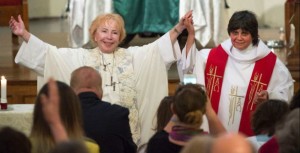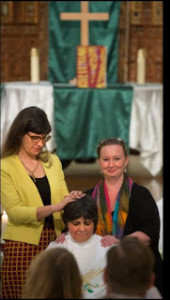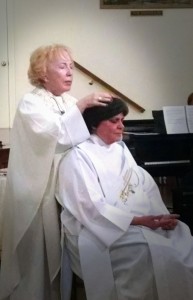Parliament of the World’s Religions: Ordination of First Woman in Utah to Roman Catholic Priesthood

 “Christianity must follow the example of Jesus and treat women as equals in every ministry including ordination,” proclaims Bishop Bridget Mary Meehan in her homily at the ordination of the first woman in Utah to the Roman Catholic priesthood on October 18, 2015. I had the honor of participating in this ordination, one of the most moving experiences I had while I was at the Parliament of the World’s Religions.
“Christianity must follow the example of Jesus and treat women as equals in every ministry including ordination,” proclaims Bishop Bridget Mary Meehan in her homily at the ordination of the first woman in Utah to the Roman Catholic priesthood on October 18, 2015. I had the honor of participating in this ordination, one of the most moving experiences I had while I was at the Parliament of the World’s Religions.
Clare Julian Carbone, like the other 220 Roman Catholic women who’ve been ordained, has the courage to follow her call even though she was excommunicated by the Vatican for being ordained. Undeterred by any action of the Vatican, Clare Julian, a former social worker and Poor Clare nun, claims her call as a priest to be a “bridge” between faith traditions and a “bridge” between this life and the next as she serves as a hospice chaplain and a “bridge in “living out our inclusivity and reconciliation with all creation within the realm of Sacramental Catholic tradition.”

 Tears fill my eyes as I take part in the sacred ceremony of laying on of hands along with an excommunicated Mormon woman, a woman rabbi, a Buddhist priest, Roman Catholics, and people of other Christian denominations. Also in the congregation are several Muslim women with joy and wonder on their faces. I recall that Bridget Mary, when I interviewed her for Changing Church: Stories of Liberating Ministers and She Lives! Sophia Wisdom Works in the World, said that the ordination of women priests reminds us that women are equal symbols of the Holy. I can see the truth of this statement especially in the faces of these Muslim women and of Kate Kelly, a brilliant lawyer who was excommunicated from the Mormon church for advocating for women’s ordination. Several days before at a Parliament workshop, I’d heard Kate choke up as she spoke about her spiritual pain when she learned that she’d been excommunicated and the choice her family had to make between love for her and loyalty to the church.
Tears fill my eyes as I take part in the sacred ceremony of laying on of hands along with an excommunicated Mormon woman, a woman rabbi, a Buddhist priest, Roman Catholics, and people of other Christian denominations. Also in the congregation are several Muslim women with joy and wonder on their faces. I recall that Bridget Mary, when I interviewed her for Changing Church: Stories of Liberating Ministers and She Lives! Sophia Wisdom Works in the World, said that the ordination of women priests reminds us that women are equal symbols of the Holy. I can see the truth of this statement especially in the faces of these Muslim women and of Kate Kelly, a brilliant lawyer who was excommunicated from the Mormon church for advocating for women’s ordination. Several days before at a Parliament workshop, I’d heard Kate choke up as she spoke about her spiritual pain when she learned that she’d been excommunicated and the choice her family had to make between love for her and loyalty to the church.
The ordination liturgy for Clare Julian includes a beautiful biblical passage describing Divine Wisdom: “I preferred Her to the light of day, for Her countenance shone unceasingly. Through Her I received all good things, and because of Her I had wealth beyond counting. Everything was given me to enjoy, but I did not know that Wisdom was the source of it all. What I learned over time, I now share freely with you, for I do not want to hide Her abundance. She is an inexhaustible treasure to humankind” (Wisdom 7:10-14a).
The newly ordained priest, Clare Julian, the other women priests presiding at the altar, and everyone at this gathering embody Divine Wisdom and shine with Her radiance. 
Bishop Bridget Mary, believing that the Eucharist belongs to the whole community, invites all gathered at the ordination service to raise our hands toward the bread and wine and to speak the words of consecration together. When I interviewed Bridget Mary in Sarasota, Florida, I had this same experience at Mary Mother of Jesus Inclusive Catholic Community, where she serves as one of the priests. I told her that I experienced my Baptist teaching of “priesthood of all believers” more fully in this Catholic community than I had in most Baptist churches, where only the pastor speaks the communion consecration words.
 In the Liturgy of the Eucharist at Clare Julian’s ordination, I’m also thrilled to join in speaking an inclusive version of the Prayer of Jesus: “God, our Mother and Father, who is in heaven, holy is your name. Your kin-dom come. Your will be done, on earth as it is in heaven. Give us this day our daily bread, and forgive us our trespasses as we forgive those who trespass against us. And lead us not into temptation, but deliver us from evil. For yours is the kin-dom and the power and the glory now and forever.” My spirit is also stirred by a beautiful voice singing “Ave Maria” to harp accompaniment and by the invitation of one of the presiding priests, Janice Sevre-Duszynsky, to present the chalice of wine at the altar.
In the Liturgy of the Eucharist at Clare Julian’s ordination, I’m also thrilled to join in speaking an inclusive version of the Prayer of Jesus: “God, our Mother and Father, who is in heaven, holy is your name. Your kin-dom come. Your will be done, on earth as it is in heaven. Give us this day our daily bread, and forgive us our trespasses as we forgive those who trespass against us. And lead us not into temptation, but deliver us from evil. For yours is the kin-dom and the power and the glory now and forever.” My spirit is also stirred by a beautiful voice singing “Ave Maria” to harp accompaniment and by the invitation of one of the presiding priests, Janice Sevre-Duszynsky, to present the chalice of wine at the altar.
In her homily, Bishop Bridget Mary gives strong support from Scripture and church tradition for the ordination of women. She links the biblical narrative of the woman who anoints Jesus (Matthew 26:6-13) with the women priests who take unpopular public action in following the Gospel. Although the male disciples denounce her, “Jesus affirms the anointing woman’s prophetic gesture for all time.” Bridget Mary also cites Scripture to show that Jesus included female disciples (Luke 8:1-3) and chose Mary Magdalene as the apostle to the apostles (John 20:11-18), and that Junia was an apostle in the early church (Romans 16:7). “There are more than 12 apostles, news flash to the Vatican!” Bridget Mary exclaims. Church tradition also affirms the ordination of women, she states: “For 1200 years women were ordained. Gary Macy, in his highly acclaimed book, The Hidden History of Women’s Ordination, reminds us that ‘references to the ordination of women exist in papal, episcopal and theological documents of the time, and the rites for these ordinations have survived.’”

Also following the Catholic Church’s traditional teaching of apostolic succession of priests, the first women priests in modern times were ordained by a male bishop. Then a male Roman Catholic bishop ordained two of these women as bishops. Therefore, in spite of what the Vatican says, the Holy Orders of these women are valid because a male bishop with apostolic succession ordained the women bishops who can now legitimately ordain women priests.
Bishop Bridget Mary comments on the importance of ordaining women: “Women priests are visible reminders that women are equal images of God. Our Roman Catholic Women Priests Movement makes the connections that poverty, violence, and abuse of women in the world are related to sexism in the church. We are breaking through centuries of Vatican opposition to women priests by disobeying an unjust church law that discriminates against women.”
Unstopped by opposition, the women priests view excommunication by the Vatican as a badge of honor and continue to claim their rightful place in the Roman Catholic Church. Bridget Mary often says: “We are not leaving the church; we are leading the church into a new era of justice, equality, and inclusion. One could argue that, when Pope Benedict XV1 canonized two excommunicated nuns, Mother Theodore Guerin and Mother Mary MacKillop, he made excommunication the new fast track to canonization! So our motto could be ‘excommunicated today, canonized tomorrow.’”

Bishop Bridget Mary commends and challenges Pope Francis: “Pope Francis told the bishops that God is not afraid of new things. Amen, Pope Francis! Here we are! Women priests are a new thing in our day! I believe that the worldwide movement for women’s equality in all religious traditions is a new work of the Spirit rising up in our times. I believe that the international women priests movement is a new work of the Spirit rising up for justice in the Roman Catholic Church. Like our sisters in other faith traditions, we are a movement of hope that gender equality will become a reality in all areas of ministry and leadership in our church. As we follow Jesus’ example of Gospel equality and walk in the footsteps of the women who ministered to Jesus, and who served as deacons, priests, and bishops in early Christianity, I believe that a new day is dawning for a more egalitarian, inclusive, flourishing church now.”
As the title of one of Bridget Mary’s books declares, Roman Catholic women priests and their inclusive faith communities are Living Gospel Equality Now: Loving in the Heart of God.”